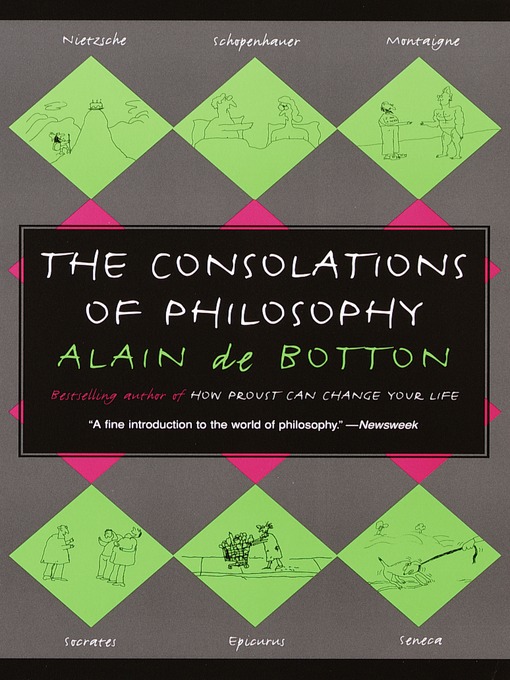Perhaps only Alain de Botton could uncover practical wisdom in the writings of some of the greatest thinkers of all time. But uncover he does, and the result is an unexpected book of both solace and humor. Dividing his work into six sections — each highlighting a different psychic ailment and the appropriate philosopher — de Botton offers consolation for unpopularity from Socrates, for not having enough money from Epicurus, for frustration from Seneca, for inadequacy from Montaigne, and for a broken heart from Schopenhauer (the darkest of thinkers and yet, paradoxically, the most cheering). Consolation for envy — and, of course, the final word on consolation — comes from Nietzsche: "Not everything which makes us feel better is good for us."
This wonderfully engaging book will, however, make us feel better in a good way, with equal measures of wit and wisdom.
-
Creators
-
Publisher
-
Release date
January 23, 2013 -
Formats
-
OverDrive Read
- ISBN: 9780307833501
-
EPUB ebook
- ISBN: 9780307833501
- File size: 10361 KB
-
-
Languages
- English
-
Reviews
-
Publisher's Weekly
April 3, 2000
Three years ago, de Botton offered a delightful encounter with a writer many find unapproachable, in his bestselling How Proust Can Change Your Life. Now he attempts a similar undertaking--not wholly successful--with the great philosophers. In clear, witty prose, de Botton (who directs the graduate philosophy program at London University) sets some of their ideas to the mundane task of helping readers with their personal problems. Consolation for those feeling unpopular is found in the trial and death of Socrates; for those lacking money, in Epicurus' vision of what is essential for happiness. Senecan stoicism assists us in enduring frustration; Schopenhauer, of all people, mends broken hearts (by showing that "happiness was never part of the plan"); and Nietzsche encourages us to embrace difficulties. Black-and-white illustrations cleverly (sometimes too cleverly) accent the text: a "Bacardi and friends" ad, for example, illustrates the Epicurean doctrine of confused needs. Self-deprecating confessions pepper the book, a succinct account of an episode of impotence being the most daring. The quietly ironic style and eclectic approach will gratify many postmodern readers. But since the philosophers' opinions often cancel each other out (Montaigne undermines Seneca's trust in rational self-mastery, and Nietzsche repudiates "virtually all" that Schopenhauer taught), readers will need to pick and choose whose cogitations to take to heart. At his best (e.g., on Socrates), de Botton offers lucid popularization--an enjoyable read with "a few consoling and practical things" to say.
-
Loading
Why is availability limited?
×Availability can change throughout the month based on the library's budget. You can still place a hold on the title, and your hold will be automatically filled as soon as the title is available again.
The Kindle Book format for this title is not supported on:
×Read-along ebook
×The OverDrive Read format of this ebook has professional narration that plays while you read in your browser. Learn more here.

